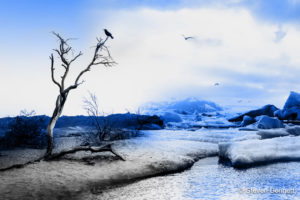One Canvas, Two Realities
By Steve Bennett | December 18, 2020
When I created Pangean Dream earlier this year, my goal was to produce a surreal study of extreme contrasts. Like all of my composite artwork, Pangean Dream began with literal photographs. I then used digital tools to bend, break, and blend the images. As the process unfolded, intention gave way to accident as the lines between “what is” and “what if” blurred, leaving the viewer to decide what’s real.*
Pangean Dream blends photographs of my two favorite places on the planet. No two scenes could be more different: Iceland’s Jökulsárlón glacial lagoon (right side) and the Mesquite Dunes of Death Valley. Iceland, with an abundance of water, is often brooding and foreboding. Death Valley, with about two inches of rainfall a year, seems strangely serene and inviting. Both eternally reinvent themselves in their own ways (although Jökulsárlón has a limited shelf life—it’s ground zero for climate change). Jökulsárlón’s massive chunks of ice collide and groan in the lagoon, casting an iridescent blue glow. The dunes silently reinvent themselves, too, as the wind-blown sands magically reset the landscape. The French writer/poet and aviator, Antoine de Saint-Exupéry, beautifully captured the desert’s essence in The Little Prince: “I have always loved the desert. One sits down on a desert sand dune, sees nothing, hears nothing. Yet through the silence something throbs, and gleams.”
And this has what to do with the time of corona? Everything. Pangean Dream is an apt metaphor for the surreal place we find ourselves in at the close of a dystopian year. As in Pangean Dream: one canvas, two realities. But while Pangean Dream is an impossible scene, my hope for 2021 is that we’re going to move past this mash-up of seemingly irreconcilable ideas and behaviors. Yes, the challenges are daunting and the suffering will be severe. But I am optimistic about the power of the human spirit.
Pangean Dream is now on display in the online “Generous Kingdom V” exhibit at the Verum Ultimum Art Gallery.
* In his thought-provoking book, The Runaway Species, neuroscientist David Eagleman suggests that bending, breaking, and blending are the core cognitive strategies underlying all creative acts. Good read for anyone interested in creativity—it’s helped me articulate and frame my artistic process.
If the contrast between Iceland and Death Valley interests you, here’s a link to my exhibition, “H20 Extremes,” which juxtaposes scenes of desiccation with scenes of an abundance of water.
Copyright © 2020 Steve Bennett
Steve Bennett is a Cambridge, Massachusetts-based visual artist. He began taking photographs more than 40 years ago, in the age of film, and transitioned to digital photography in the late 90s. Today, in addition to taking and making traditional street, macro, and landscape photographs, he creates photo-based abstract composites designed to take viewers on fanciful flights of the imagination through virtual realms. His work has been displayed in numerous juried exhibitions, and at Google’s Kendall Square, Cambridge offices as well as various technology, biotech, and financial service companies in the Boston area.

Really fascinating post and stunning image. I admit I had to look up Pangea, but the metaphor is very cool. It is like you are putting the continents back together in the image, and hoping that people will have the opportunity and spirit to put our broken world back together too.
What a poetic and insightful comment. Thanks so much!
East meets West; Earth meets Ice; Life meets Death; a truly transcendent and thought=provoking image.
So much to explore here – well done!
What a great comment–love your “read” of the image. Thanks!